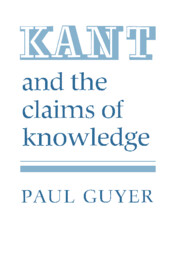Book contents
- Frontmatter
- Contents
- Acknowledgments
- Note on sources
- Introduction
- Part I Kant's early view
- Part II The transcendental deduction from 1781 to 1787
- Part III The principles of empirical knowledge
- Part IV The refutation of idealism
- Part V Transcendental idealism
- 15 Appearances and things in themselves
- 16 Transcendental idealism and the forms of intuition
- 17 Transcendental idealism and the theory of judgment
- 18 Transcendental idealism and the “Antinomy of Pure Reason”
- Afterword
- Notes
- Index of passages cited
- General index
16 - Transcendental idealism and the forms of intuition
Published online by Cambridge University Press: 09 March 2010
- Frontmatter
- Contents
- Acknowledgments
- Note on sources
- Introduction
- Part I Kant's early view
- Part II The transcendental deduction from 1781 to 1787
- Part III The principles of empirical knowledge
- Part IV The refutation of idealism
- Part V Transcendental idealism
- 15 Appearances and things in themselves
- 16 Transcendental idealism and the forms of intuition
- 17 Transcendental idealism and the theory of judgment
- 18 Transcendental idealism and the “Antinomy of Pure Reason”
- Afterword
- Notes
- Index of passages cited
- General index
Summary
Kant presents the “Transcendental Aesthetic” as a theory equally about space and time. But it is clear that in this part of his work his views about space were fundamental and that the argument for the transcendental ideality of time proceeds only by parallels (often strained) to the example of space. This is not to say that Kant was any less committed to the transcendental ideality of time than to that of space. His fierce defense of his theory about time in the face of the criticisms of Lambert, Sulzer, and Mendelssohn shows how committed to the transcendental ideality of time Kant was, and in the arguments derived from the theory of judgment rather than intuition we shall see that it is time rather than space which is foremost in Kant's thought. But the derivative nature of the theory of time in the “Transcendental Aesthetic” does mean that I can focus my exposition of Kant's arguments there on the case of space, as indeed most commentators do.
The amount of commentary generated by Kant's views on space may be a better reflection of the interest of philosophers in this subject than of the intrinsic merits of Kant's own theories. In any case, it is not my intention to add to the already enormous literature yet another general discussion of the “Transcendental Aesthetic” but only to consider the specific means by which Kant proposes to argue from the conclusion that space and time are indispensable forms of intuition to the further result that they are therefore only features of representations rather than features of things as they are in themselves.
- Type
- Chapter
- Information
- Kant and the Claims of Knowledge , pp. 345 - 370Publisher: Cambridge University PressPrint publication year: 1987



